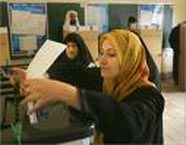Neighbours will affect balance of Iraqi polls
 Cairo - Iraq's provincial elections, due to take place on January 31, may be a vote for new representatives in 14 of the country's 18 provinces, but - as with so much in Iraq - they are not just a local affair.
Cairo - Iraq's provincial elections, due to take place on January 31, may be a vote for new representatives in 14 of the country's 18 provinces, but - as with so much in Iraq - they are not just a local affair.
The effect of Iraq's neighbouring states on the outcome of the elections remains a factor that cannot be ignored, as all neighbours play out their cards using their individual connections to Iraqi domestic politics.
Revolutionary Shiite Iran continues to be perceived as the key external player in Iraq, where Shiites make up the majority of the population.
Amr Hamzawy, Senior Associate for the politics of the Middle East at the US-based Carnegie Endowment for International Peace, believes that Iran is a significant player inside Iraq in whatever political process that takes place, including elections.
"Iran has powerful allies inside the war-torn country, and it tries to send them across the political spectrum. It has also managed to penetrate Iraqi institutions, at different levels," Hamzawy told Deutsche Presse-Agentur dpa.
According to a US Department of Defence report issued to Congress in January, Iran still poses "a significant threat" to Iraq as Iran's actions were said to reflect a desire to oppose the development of a secure and stable Iraq.
The report said Iran might use Iraq's provincial elections to expand its influence in the country by supporting pro-Iranian candidates and political parties.
The US and the Iraqi government have long voiced concerns that Iran is supporting militants fighting Iraqi and international forces in Iraq, a charge that Iran denies.
A well-placed Iranian political science professor, speaking to dpa on condition of anonymity, said the elections in Iraq, and events in the country in general were currently overshadowed by Iran's relationship with new US President Barack Obama and vice versa.
The academic told dpa that if better dialogue did not develop between the US and Iran, "Iran would adopt an antagonistic approach towards all US-connected developments in Iraq."
"Of course, if we look beyond Iran, there are Turkey, Saudi Arabia and Syria," said Amr Hamzawy.
Hamzawy said that Turkey had limited instruments to influence the outcome of the elections, despite its nervousness over the status of the mixed-ethnic province of Kirkuk.
A Kurdish-controlled-Kirkuk was, in Turkey's eyes, a threat to its national security, he said. For now, the issue was postponed, as Kirkuk would not be voting in this round of elections.
Meanwhile, Saudi Arabia could play a significant role, said Hamzawy, asserting that the kingdom had been funding various Sunni movements in Iraq, using tribal connections, throughout the conflict.
"Syria can also be relevant, to an extent, in regard to the few Sunni movements that have decided reluctantly to join the political process," he explained.
Sunni coalitions have decided to participate in the elections in far greater numbers than in 2005, when they essentially boycotted the poll. They have become strong competitors in a number of ethnically and religiously mixed provinces.
"Sunnis are trying to capitalize on what has happened over the past two years. Awakening councils are becoming stronger, people are more aware of the need to reform the political process inside Iraq," Hamzawy said.
Iraqi analyst Zuhair al-Jezairy highlighted an increasing political engagement among Iraqis: People were more aware of the nature of voting and the elections.
"In the main cities, people are looking for those who would fight corruption, those with integrity. Iraqis who voted last time, compare what the candidates whom they voted for have done for them, and compare with this year's candidates," al-Jezairy told dpa.
Al-Jezairy also admitted while Iran would play a role in the coming elections, he believed it was not going to be a "decisive" one.
"Iran will use its tools to affect the results of the elections, such as the trade and economic agreements, plus the political power of the Iranian-backed parties," he added.
"It is definitely not going to be a minor role, but not decisive. As on the other hand, the participation of the Sunnis and Arabs will lead to a kind pf balance in the domestic political life," al-Jezairy said. (dpa)